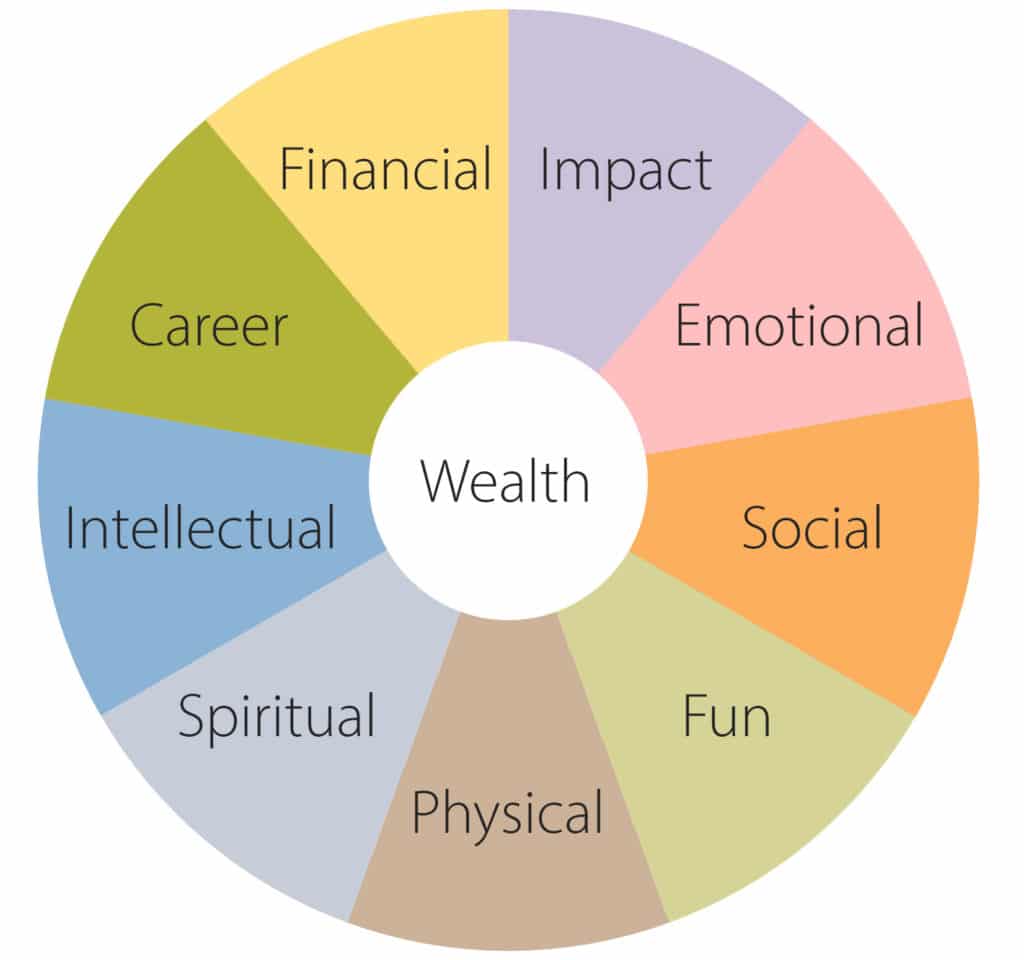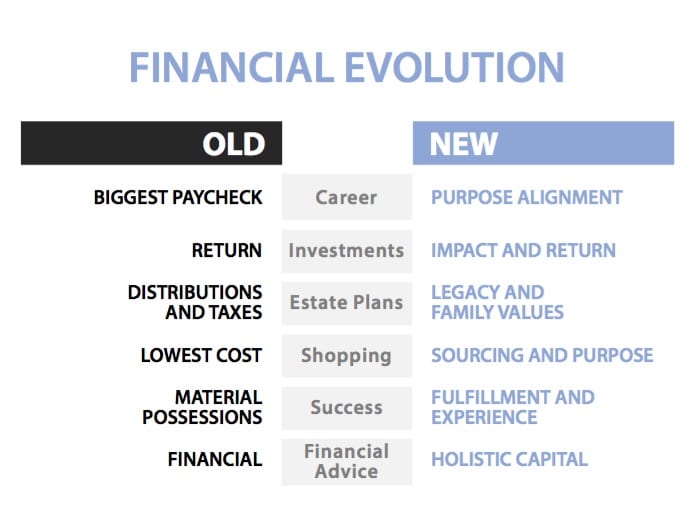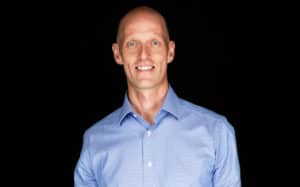Seth Streeter: The Nine Dimensions of Wealth
BY PAKSY PLACKIS-CHENG
Mission Wealth is one of America’s Top 300 Registered Investment Advisers according to the Financial Times (June 2015).
impactmania speaks with co-founder and CEO, Seth Streeter, who recently delivered a TED talk about The Untethered Life. Streeter presents vulnerability as a strength, redefines financial health, and shares the nine dimensions of wealth.
In the TED talk, you encourage people to untether yourself. Isn’t it easy to talk about redefining wealth when you have financial independence? What advice do you have for people who would like to untether themselves but are busy spinning around earning a paycheck?
Most people are following the path that society has laid out for them. They’re pursuing success by often time external definitions about the amount of money you earn, the size of your house, the type of car you drive. They believe that they will become happy once they achieve a higher 401K balance, a new car, a new house.
Oftentimes it takes until later in life, they realize, “Wow I’ve achieved a lot of these things that I thought would bring me happiness, but I’m still not fulfilled.”
There’s still a gap, there’s still a void that I’m experiencing. So what is success? What is truly wealth?
What would the first steps be for untethering yourself?
Step one is to really assess: where are you today?
I have these nine dimensions of wealth that I like to take people through.
Let’s talk about your impact. Are you satisfied with the difference that you feel you’re making? Could be in your family, community, and society as a whole.
Let’s talk about your emotions. Are you stressed all the time, are you sleeping well, do you still have a general positive attitude? How emotionally wealthy are you?
Let’s talk about your relationships. Do feel like the caliber of your relationships with your friends and family in the community, is what you wanna have in your life? Or would you like to deepen those relationships or have more relationships?
How about fun? How much daily joy do you have?
Physical capital; how your body looks, feels, and functions. Are you satisfied with your energy levels, with how your body is able to produce life experiences for you?
And then, I will have people look at their spiritual capital. Do you have a connection to a framework beyond yourself?
Intellectual capital is, are you mentally stimulated? Or are you bored? Do you feel like you’re growing and challenged?
Career wealth is around your alignment with your career. Do feel like your values and your passions and your talents are in line with your employment?
There’s obviously financial capital. Are you happy with the degree of financial abundance you have in your life?
By having people assess where they are in these different dimensions, they can identify where maybe they need to put more energy or resource, in order to have more of the wealth that they’re looking to have in their lives.

The Nine Dimensions of Wealth.
How do you help couples where maybe one is on board and the other isn’t?
Well, it always starts with ourselves. The first step is to say, “Where am I?” If that’s the husband saying, “Where am I?” The wife, the child, the parent, “Where am I?” The family dynamic is really a collective of a bunch of individuals; together they create something as a we. It starts with where am I as an individual.
Then it’s where are we as a couple, as a family? Where are we, as community members, as humans on this planet? The circle can continually expand.
I think the first step is to really hit the pause button and take the time. I deal with couples everyday. For them to be able to step away from their careers, and their shuttling kids everywhere, and the presidential debate!
To really stop and say, “Where am I? Where are we? Are we happy here?” And if not, “What would happiness really look like for us?” Actually take some time to do some envisioning of what that would be, engineer backwards, and say, “Okay, this is the gap.”
This is where we know we wanna be, this is where we are today. What are the steps we need to take? The tangible baby steps we need to take, to progress in that direction.
There must be a lot of psychology that comes with it.
Man, and that’s why I think being a wealth advisor is ideal to help be a catalyst for change. There is so much psychology around money. It’s not just people’s financial advisor; it could be their accountant, attorney, or banker.
When you show up around money issues, there’s a lot of stuff underneath the surface. There are control issues, a lot of fear, and a lot of dynamics. Family dynamics that come out around money conversations, to be an advisor who starts to ask questions and then the person starts to show emotion. To say, “Okay, here’s a tissue box. It seems like you’re upset, let me know when you’re ready to get back to talking about your asset allocation.”
They’re missing the opportunity to find the need beneath the need. The need to meet isn’t: did you get 7 percent rate of return? It’s about your longing to have a deeper connection with your daughter. Or you’re really unfulfilled in your career. Or you’re feeling like a stranger in your marriage. Or you’re just sad that your body is really in pain and not healthy. By helping people identify it, they then can become empowered and take productive steps in that direction.
Would you say most people are working so hard on the money issue, because they’re clouding their real need — “If I have enough funds, everything will be better?”
This is just how we’re wired, right? They are so caught up. Look, I experienced it too, we get hundreds of e-mails, battling traffic, trying to sit in multiple meetings, and you’re running trying to get ahead. While missing the precious moments, that really matter. Whether it’s with loved ones, focusing on your health, or finding work you’re passionate about.
It requires a leap for someone to find his or her genius or this aligned path. It requires a leap, which isn’t clearly defined, it’s risky; it’s unfamiliar.
And yet, when we take this leap, that is where the fruit is, that’s where the juicy stuff is.
By playing it safe and just doing what we’re supposed to do and fitting in that extra meeting and staying up until 11:00 doing those extra emails and fighting traffic ‘cuz, by God, I gotta get to this meeting ‘cuz it’s really important, we might be absolutely missing the real wealth that’s available to us.

Redefining Financial Health.
What kind of relationship do most people have with money?
They see it as a power chip, as a bargaining tool. They see it as something to be acquired and managed and tamed, if you will. They never have enough of it; they never feel they have control of it. It’s this thing that is fleeting. It’s unmanageable and there’s fear around that because it’s outside them.
And yet, when someone realizes that wealth is a treasure within, they go, wow. I saw the sunrise and my son gave me a huge hug. I opened the door for this woman that was coming into the store this morning. I called an old friend, and I had a great jog this morning on the beach. All these little things that have really nothing to do with money, that’s where the wealth is.
When we operate from the place of alignment, we start to get more financial abundance, too. Because we start doing work that is a natural expression of our gifts, we start to attract people in our life that we can have really fruitful partnerships with.
We are better at what we do because we’re operating from passion.
When you actually are in full expression of yourself, things seem to just cooperate. When we power ahead, like in my TED talk, I talked about a corporate attorney. He was very successful by traditional terms. He was making over a million dollars a year, he had the big house, they had this great lifestyle, the cars, kids in private schools, country club. The guy was miserable.
He was following the prescription that he was given from a young age to work hard, get into a good college, into good law school, get into a good firm, work your way up the ranks and become partner. He was following the prescription he was given and he was still miserable.
Now he is a high school history teacher. He’s operating from joy. And yes, he makes a lot less money but I would argue he’s much wealthier than he ever was before.
You are the co-founder and CEO of Mission Wealth. What insight do you have for young entrepreneurs?
I would say find your passion from within. Then allow that to expand in the people you hire, in the types of customers or clients you work with, in the types of products or services that you create.
If you do it from a place that naturally starts, it will be absolutely joyful to build your business.
Did Mission Wealth have this at its core from the beginnings?
No, this wasn’t something that I identified with when I started the company in 2000.
I wasn’t in touch with this being my natural purpose. I was still on that track where I was about achievement. And I’ll tell you, the energy I had was one of not failing. It was actually a fear based energy of “I’m not gonna fail.” There was a kind of a frenetic energy. No matter what, “I’m not gonna fail, I’m not gonna fail, I’m gonna make this happen, I’m not gonna fail.”
As I’ve evolved and become more aware, my energy is now much more one of service. I know this sounds too woo woo, but it’s coming from love not for love.
I’m just here to just try to make a difference. To be completely who I am versus I need to teach people outside of me.
I got the graduate degrees, I’ve bought the couple homes. I hit certain milestones in business, as far as revenue, as far as number of clients, or certain assets. Those are just numbers, those don’t give you fulfillment. It wasn’t until I realized like, “Wow, I am just here to be of service, I’m here to shine a light for others, I’m here to help people amplify their gifts.”
When I started operating from that place, our business has grown exponentially.
Where was this fear coming from?
It was a fear of failure that I had from a very young age. On paper, I was achieving but it was a nervousness of failure. It was like, “I’ve gotta ace this test.”
I put pressure on myself because I believed that my productivity was my self worth.
When I scored points in the basketball game, “I’m worthy.” When I got elected to student government, “Okay, I’m liked and I’m enough.”
It’s kind of like Marilyn Monroe when she felt she wasn’t beautiful anymore, she didn’t wanna live. Her whole external identity was based on her beauty. My self-worth was based on my productivity and my accomplishment.
When you first hold your child. Are they worthy? Yes. Did they have to do anything to be worthy? No.
They’re just enough right in that moment. I had to get back to that understanding that I am worthy regardless of my productivity, regardless of my performance. When you let go of that fear based energy and you operate from that place of love, then all of a sudden, you actually kick more butt!
What has been a surprise in learning for you?
I’ll tell you one of the biggest learnings has been the power of vulnerability. There are not a lot of white male financial CEOs who are going to have tears in their eyes talking about their connection with an orphan or talking about their weaknesses and their fears.
For the first 23 years of my career, I put on the right type of persona, which is showing your strength. It was operating from a place of confidence, responsibility, and intelligence.
The TED talk was a very vulnerable thing for me to do.
In doing that, I’ve had tremendous new connections. People reached out of the blue and shared wonderful things of how they relate to it; how they never knew that I had that type of orientation before; and how they almost like me more because of my vulnerability.
So it didn’t work against me. By showing, quote unquote, weakness, it’s actually strength.
Who has left an imprint on their professional DNA?
I have a lot of people who have been kind of spiritual counselors and business people who have inspired me.
One person would be Marilyn Tam. She grew up in child labor in Hong Kong. She then became an executive with Reebok, Nike, and CEO of Aveda. She left all that to go into service. She worked with the country of Bhutan to help them create their gross domestic happiness program.
Then she ended up creating International Happiness Day. This woman who overcame a tough childhood and excelled in the corporate world, but knew she was ultimately about being of service.
I really respect Tony Robbins, too. He has been a positive influence in my life. I see how he is of service. He’s strong, but vulnerable. He’s making a difference, and always innovating.
What’s next?
I’m really excited to help bring this throughout my industry and to expand it nationally. I believe that this is a new opportunity for the financial industry to become more conscious, to help people in a deeper and a more profound way. I see me doing more speaking, writing, and coaching around conscious wealth.


